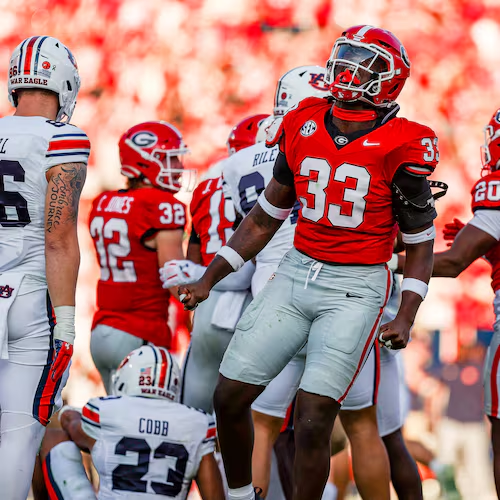The decision of highly touted wide receiver Zachariah Branch to transfer from USC to the University of Georgia (UGA) was a significant development in the world of college football, particularly in the SEC and the Pac-12 conferences. Branch’s decision to switch allegiances marked a fascinating moment in the ongoing evolution of college football’s transfer portal landscape. To understand why Zachariah Branch made this move, it is essential to explore the strengths of the Georgia football program, including its coaching staff, player development, program culture, and consistent success. This detailed examination of UGA’s football prowess offers insight into the dynamics behind this high-profile transfer and showcases the broader implications for the college football landscape.
The Georgia Football Program: A Legacy of Excellence
Georgia football has long been one of the most prestigious programs in college football. Under the leadership of head coach Kirby Smart, the Bulldogs have cemented themselves as a national powerhouse. Smart, who took over as head coach in 2016, transformed the program into a perennial contender for the College Football Playoff (CFP) and national championships. His approach to recruiting, player development, and game strategy has earned Georgia a reputation as a dominant force in the sport.
Coaching and Leadership under Kirby Smart
Kirby Smart’s leadership has been the bedrock of Georgia’s rise to prominence. A former defensive coordinator for Alabama under Nick Saban, Smart brought a wealth of experience and knowledge to Georgia when he took the reins. His recruiting acumen and his ability to develop top-tier talent have played an instrumental role in Georgia’s success. The team has become known for its stout defense, powerful running game, and disciplined approach on both sides of the ball.
The 2021 and 2022 seasons were particularly defining for Smart and the Bulldogs. In 2021, Georgia won its first national championship in over 40 years, beating Alabama in a thrilling 33-18 victory in the CFP National Championship game. This victory was a testament to Smart’s strategic vision and ability to get the best out of his players on the grandest stage. The Bulldogs followed up their 2021 title with another dominant season in 2022, making the case that Georgia was now firmly entrenched as the premier program in college football.
For Branch, the opportunity to work with a coach who has proven his ability to develop players and build championship-caliber teams would have been a major draw. Smart’s track record in producing NFL-ready talent, particularly at the wide receiver and skill positions, is a key reason why elite players, like Branch, are attracted to UGA.
Player Development and Success in the NFL
One of the most attractive aspects of the Georgia football program is its ability to develop talent and send players to the NFL. Under Smart’s leadership, UGA has seen numerous players make the leap to the professional ranks, and many of them have enjoyed successful careers. This includes players at nearly every position, from offensive linemen like Andrew Thomas to defensive players like Jalen Carter, who has been regarded as one of the top prospects in recent years.
Georgia’s success in developing NFL-caliber players is a significant reason why top recruits from across the country want to join the program. Branch, a highly sought-after talent, would have seen the success of players who have made the transition from UGA to the NFL, particularly at the wide receiver position. Notable Georgia wide receivers like George Pickens, who was selected by the Pittsburgh Steelers in the 2022 NFL Draft, represent the high standard of talent development at UGA. Branch, who has aspirations of playing in the NFL, would have recognized that joining Georgia’s program would put him in the best position to showcase his skills and make the transition to the next level.
Championship Pedigree and Program Culture
Georgia’s success in recruiting and player development is complemented by its winning culture. The Bulldogs have cultivated an environment where competition is fierce, and players are pushed to be their best. The program’s commitment to excellence is evident in its consistency in recruiting top-tier talent and its sustained success on the field. For Branch, the opportunity to be a part of such a high-caliber program would have been a major motivating factor in his decision to transfer.
The winning culture at Georgia is not limited to just the football team. The entire athletic department at UGA has a rich history of success, which creates a broader environment where athletes from all sports can thrive. This sense of pride and competition permeates throughout the program and helps create a strong sense of community and support for student-athletes.
The Success of Georgia’s Offense and Fit for Branch
While Georgia has traditionally been known for its dominant defense, the team has made significant strides on offense in recent years. With the development of quarterback Stetson Bennett, the Bulldogs have become a much more balanced team, capable of both running the ball effectively and exploiting defenses through the air. The wide receiver position has been a focal point in Georgia’s offensive evolution. In 2021, the Bulldogs saw major contributions from wide receivers like Brock Bowers, who has become one of the best tight ends in college football. This success in the passing game has made Georgia a more attractive destination for wide receivers like Branch, who are looking to showcase their talents in a high-powered offense.
Branch’s skill set, which includes excellent speed, route running, and hands, makes him a great fit for a Georgia offense that is looking to expand its aerial attack. UGA’s offensive system under coordinator Todd Monken has evolved to incorporate a more balanced and dynamic approach, which would suit Branch’s strengths as a playmaking wide receiver. The opportunity to work with a strong quarterback and a system that plays to his talents would certainly have been an appealing factor in Branch’s decision to transfer.
The Transfer Portal and the Changing Landscape of College Football
The rise of the transfer portal has fundamentally altered the landscape of college football. Players are no longer bound to one program for their entire careers, and the freedom to transfer without penalty has opened up new opportunities for both athletes and programs. For high-profile recruits like Zachariah Branch, the transfer portal provides a platform to make decisions based on factors such as playing time, coaching, and team success.
In Branch’s case, transferring to Georgia offered several advantages. First, the Bulldogs’ recent success in the SEC and on the national stage made them an attractive option for any player seeking to win championships. The chance to play in a high-powered offense, paired with a defense that often puts the team in position to win, would have been a major incentive. Additionally, Georgia’s track record of developing NFL talent, particularly at wide receiver, gave Branch confidence that UGA would provide him with the resources and platform to showcase his skills.
USC’s Changing Landscape
While USC has historically been one of the most prestigious programs in college football, its current trajectory under head coach Lincoln Riley might have influenced Branch’s decision to transfer. Riley, who took over the program in 2022, brought a high-powered offensive system to the Trojans. However, USC’s lack of consistency in terms of defensive play and overall team success in comparison to Georgia may have led Branch to seek a more well-rounded program that offered both elite offensive and defensive units.
USC’s challenges in consistently competing for national championships, coupled with Georgia’s dominance in both the SEC and nationally, may have made Georgia a more appealing option for Branch. Additionally, the program culture at Georgia, focused on winning championships and player development, would have provided Branch with a clearer path to achieving his personal and professional goals.
Zachariah Branch’s decision to transfer from USC to Georgia was influenced by several key factors, all of which point to the strength and appeal of the Georgia football program. The leadership of Kirby Smart, the program’s ability to develop NFL talent, and Georgia’s championship pedigree created an environment that was too attractive for Branch to pass up. Furthermore, the Bulldogs’ offensive evolution and the chance to work in a system that maximizes the talents of playmaking wide receivers played a significant role in Branch’s decision.
In an era where the transfer portal is reshaping college football, Branch’s move to Georgia serves as a powerful example of how programs with sustained success, strong coaching staffs, and a proven track record of developing talent can attract top-tier athletes. Georgia’s ability to continue to recruit and develop players at the highest level ensures that the Bulldogs will remain a dominant force in college football for years to come. For Branch, joining Georgia’s storied program gives him the best chance to realize his dreams of competing for championships and ultimately making the transition to the NFL.



